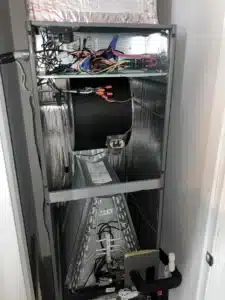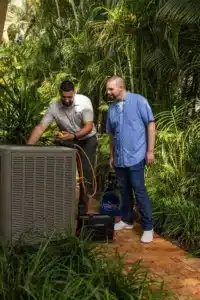The Importance of Coil Cleaning for Florida HVAC Systems
Florida HVAC systems work harder than those in almost any...
In the realm of HVAC (Heating, Ventilation, and Air Conditioning) systems, the concept of recirculated air plays a significant role in maintaining indoor comfort. While the term might sound technical, understanding what recirculated air is and how it functions is essential for homeowners seeking efficient and effective climate control. This article provides a factual exploration of recirculated air and its relevance in HVAC systems.
Recirculated air refers to the process by which a portion of the air within a space is captured, treated, and then reintroduced into the indoor environment. In HVAC systems, this is achieved through the circulation of air within the system itself. Rather than constantly drawing in outside air, a portion of the already conditioned air is recirculated to maintain a consistent temperature and humidity level.
Air Return Vents
Central to the recirculation process are air return vents strategically placed throughout your home. These vents collect indoor air, which has been circulated through the HVAC system and has either been heated or cooled to reach the desired temperature.
Air Handling Unit (AHU)
The air handling unit is a core component responsible for treating the recirculated air. Within the AHU, the air undergoes filtration to remove impurities, such as dust and allergens. Additionally, the air may pass through a heat exchanger or a cooling coil to adjust its temperature before being redistributed.
Ductwork
Ductwork serves as the conduit for the recirculated air to travel from the return vents to the air handling unit and back into the living spaces. Well-designed and properly sealed ductwork ensures efficient air circulation and minimizes energy loss.
Energy Efficiency
Recirculating air allows HVAC systems to operate more efficiently. By treating and reusing a portion of the already conditioned air, the system expends less energy compared to continuously drawing in and treating outdoor air.
Consistent Indoor Climate
Recirculated air contributes to maintaining a consistent indoor climate. It helps avoid temperature fluctuations and ensures that the air entering your living spaces is already conditioned, reducing the workload on the HVAC system.
Improved Air Quality
The filtration process in the air handling unit plays a crucial role in enhancing indoor air quality. As the recirculated air passes through filters, common contaminants are removed, resulting in cleaner and healthier indoor air.
Balancing Fresh Air Intake
While recirculated air is beneficial, a balance with fresh outdoor air is essential for maintaining indoor air quality. HVAC systems often include mechanisms to introduce a controlled amount of fresh air to prevent stagnation and ensure a healthy environment.
Regular Filter Maintenance
To maximize the advantages of recirculated air, regular filter maintenance is crucial. Clean filters promote efficient air circulation, reduce strain on the HVAC system, and contribute to improved indoor air quality.
Recirculated air is a fundamental aspect of modern HVAC systems, offering energy efficiency, climate consistency, and enhanced indoor air quality. Understanding how this process works can empower homeowners to make informed decisions about their HVAC systems, ensuring optimal performance and long-term comfort. Regular maintenance, proper filtration, and a balanced approach to fresh air intake contribute to a well-functioning HVAC system that efficiently recirculates air for a comfortable and healthy indoor environment.

Florida HVAC systems work harder than those in almost any...

Indoor air quality plays a major role in how a...

Ventilation is one of the most important yet often overlooked...

In Florida, air conditioning is not a luxury. It is...

Many homeowners assume that central air conditioners pull fresh air...

Preventive AC maintenance plays a major role in keeping cooling...